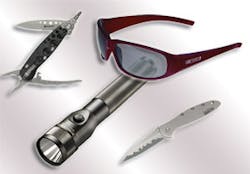Taking it personally
When it comes to personal gear, techs have opinions across the board on where they purchase most of their equipment.
Unlike socket sets, diagnostic tools and pneumatic impact drivers, personal gear comes out-of-pocket for many techs. More often than not, they aren’t able to discount their buys or credit them to the shop as supplies necessary for their job. Other times, their employer might provide a general inventory of personal equipment, such as uniforms and boots, flashlights or gloves.
STOCK TO SELL
It’s first best to determine how techs decide when and where to purchase their personal equipment. Some supplies they use can be picked up at local hardware stores. This gear is also sometimes replaced impulsively when they step onto the truck, if the knife or flashlight breaks that day.
Other techs consider waiting for their go-to distributor, if they can rely on the truck’s arrival on a particular day and time.
“We know they’re coming on a certain day of the week, so we can wait,” said tech Doug Bethea, owner of Bethea’s Auto Care. “And if you have any problem, you know they’ll stand behind it, so you know who you get it from, so not a problem.”
Along with stocking the equipment, tech’s like to take advantage of the interest-free credit distributors provide.
“I personally do some of both,” said Mike Steptoe, owner of Reliable Auto Repair. “As a shop owner, it’s easier for me to have the company purchase (personal gear).
“So sometimes, I won’t go research it at a hardware store or something like that. It’s like, ‘Ah just give it to me, and put it on my shop account…’ Done and over with.”
Body shop tech Mike Lesniak also relies on his distributor for some personal gear, as well as most other equipment, based on the convenience of the distributor coming to his shop.
“It’s nice to just be able to go on the truck, and if you don’t have the cash right there, you can pay them the following week, depending on what you’re buying,” said Lesniak.
Tech Gary Miller, on the other hand, explains it may be based more on luck than loyalty.
“Sometimes it’s the tool truck that has them, more than anything,” said Miller. “Not every one has got knives. Not every one has got shoes, things like that.”
Professional Distributor’s sister publication, Professional Tool & Equipment News asked technicians, via the online blog at www.pten.com, how they get personal gear. Many responses followed the same idea: if it’s not on the truck, it’s more difficult to sell.
“It is really hard to buy stuff out of catalogs from the dealers. Most do not keep these items in stock or only have limited access,” wrote Eric Karl. “It is more reassuring when you can spend some time at stores to try items on and get a feel for them before you buy them.”
FACTORS TECHS CONSIDER
Along with keeping products in stock, technicians focus on other factors such as quality and price, when determining what personal gear to purchase.
Karl said he’ll still make purchases for personal gear, such as gloves, based on their quality and suitability for the job he’s performing. Plus, professional quality sometimes isn’t available for purchase in-store.
Generally, techs advised they most often pick up gloves, flashlights and belts from their local distributors, due in large part to the product’s construction and reliability as a professional product.
Technicians will rely on brand names when deciding what personal gear they need.
“You like to buy something like that, that’s name brand, so you don’t have to mess around with it, have it worn out before it’s time,” said Miller.
Because some techs tends to buy items out-of-pocket, they may pay more, but usually with the guarantee that if anything goes wrong, someone’s there to back the product.
“On a personal level, yeah you’d probably do it differently. Because it’s truly you’re money. Where the tools, you get to write off a percentage,” said Steptoe.
While still relying on warranty, some techs, like Lesniak, also focus on price.
IF THE SHOE FITS
Boots get a little more tricky.
Although some techs will work with their tool dealer, the general consensus is to purchase shoes at a local store, where they’re able to try them on before they buy.
“I haven’t purchased shoes from a tool truck largely because the dealer isn’t too keen on it, and I can see why. He can’t really maintain a selection of models and sizes on his truck,” wrote Harry Zier, in response to the PTEN blog. “I could pick a shoe out of a flyer but … no one knows how true to size they’ll run.
“The dealer would have to send them back or try to unload them on someone else if the shoes didn’t fit. I usually get my work shoes from a shoe store. …”
Lesniak agrees. “Usually (distributors) don’t have them in stock, and you have to worry about whether they fit or not,” he said. “And they don’t stock a bunch of sizes on there, they order them in.”
Other shops provide pre-selected brands for their employees, avoiding a retail purchase all together. This includes Bethea’s shop.
“Most everybody here wears Red Wing shoes, we have a local store. We go and get them there,” said Bethea.
Some shops, like Steptoe’s, may also include boots as part of the uniform, which may be rented from certain companies.
Remember that no technician and no shop is the same. All stock should be considered per the customer base that you sell to.
